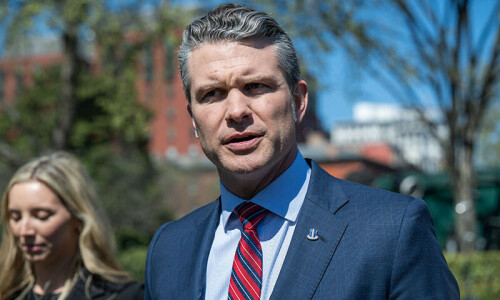
A SMALL line in a news story a few days ago caught my eye. The setting was a hearing in the Senate Standing Committee on Planning and Development at which high officials from the Planning Commission were answering questions about the China-Pakistan Economic Corridor (CPEC). The line that caused me to do a double take was this one: “The committee was informed that only Chinese industrialists would be allowed to set up their industries in the proposed economic zones along the corridor.”
Surely this was a mistake, I thought, so I called some people, including members of the committee, to ask whether this had indeed been said. They confirmed that, yes, the officials from the Planning Commission had indeed said this.
So what’s going on? Under the CPEC umbrella, there are nine Special Economic Zones planned. One each in Punjab, Khyber Pakhtunkhwa, Balochistan and Islamabad, two in Sindh and one each in Fata, Azad Kashmir and Gilgit-Baltistan. Going by the CPEC website, work does not appear to have begun on any of them yet. The relative size of each is also not disclosed, nor are there any details about the special infrastructure requirements for each.
Editorial: CPEC transparency
The website claims that these are Chinese-financed projects, though it doesn’t tell us what the terms are, whether the financing is concessional or on commercial terms. We also don’t know how the energy and water requirements of these zones will be met. Will there be new transmission and distribution lines, grid stations for electricity, gas pipelines and compressors, water pipelines, and if so, where will the water be sourced from?
If gas will be supplied from the grid, what will be the merit order placement of these industries in the gas load curtailment plan? Or will they be required to import their own LNG, in which case what third-party access rules will apply for the transport of that gas from the regasification terminal to the economic zone?
####What is the plan for these Special Economic Zones here in Pakistan? Will only the Chinese have access to them?
We know nothing about the security arrangements inside the zones, and if they are for Chinese investors only, then presumably a large number of Chinese personnel will be living in or near them. Will the CPEC security force be patrolling inside the zones, or will they only guard the perimeter, leaving patrolling and other routine policing functions to the provincial police forces?
We have some indication that industries set up in these zones will not be paying direct taxes. But will their imports be dutiable? If they procure from a local source, will they be liable to sales tax? Will taxes be applicable on the power and gas bills? And if they are going to be largely immune from local taxes, then will those Pakistani parties who procure their output have to pay a sales tax on the transaction?
Take the example of Habantota port in Sri Lanka. The Chinese built it, the Sri Lankans found they could not afford the repayment obligations, so they agreed to give the Chinese an equity stake and have them run the port. As an aside, the Chinese insisted on building a large industrial zone of around 15,000 acres (6070 hectares) next to the port for their investors and for housing their personnel. And then claims began to circulate in the Sri Lankan media, echoed by important lawmakers, that along with the land the government had also given policing powers to the Chinese government inside the housing colony, meaning a little Chinese enclave could now be built inside Sri Lanka that would effectively be a mini Chinese colony.
I have scoured the Sri Lankan media coverage of this affair that had led to large protests this January, and cannot find confirmation or any denial of the claim that a mini Chinese colony is being built in Habantota, so we have little more than the word of the protesters to go by for now.
But what is the plan for these Special Economic Zones here in Pakistan? And what is our contingency plan in the event the repayment obligations connected with all the investments coming under the CPEC umbrella prove too burdensome for the economy, like what happened with Sri Lanka? We know the Chinese are averse to rescheduling or forgiving debts owed by foreign governments and, in any case, it is a bad idea to take on debt with the intention of later asking for the repayments to be rescheduled.
In the event of difficulties in making repayment, one possibility is that Pakistan could be asked to grant land for Chinese investments and residential colonies, and delegate law enforcement and governance over these enclaves to federal or perhaps even Chinese authorities. In some measure, enclaves look like they are already planned if it is true that the Special Economic Zones, for which energy and water supplies will have to be supplied from Pakistani resources, will be open only to Chinese investors.
Perhaps it would be a better idea to allow access to investors of all types to these Special Economic Zones and, if that is not the case, the government should explain why they thought it was a good idea to sign agreements for special zones to which only Chinese investors will have access. How is this expected to help Pakistan?
Will our role be only to consume the output of these zones, or will these zones also create employment for Pakistanis, and contribute tax revenue to the exchequer, and foster backward and forward linkages to generate more investment?
It bothers me that something as large as this is being done with so little information known publicly. If it hadn’t been for this hearing at the Senate, we might never have known that the government has agreed to allow Special Economic Zones to which only one category of investor will be allowed in.
If there are perfectly reasonable answers to the questions asked here, it would be helpful for the Planning Commission to release them.
The writer is a member of staff.
Twitter: @khurramhusain
Published in Dawn, March 9th, 2017

















































